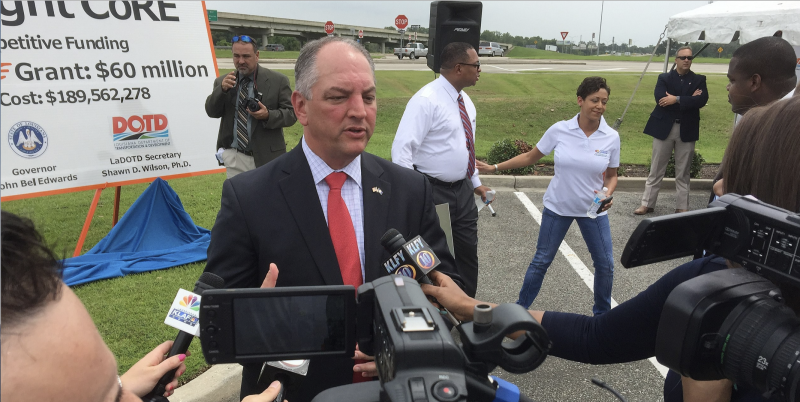
Grover Norquist, president and founder of Americans for Tax Reform, joined Jeff Crouere on his radio show, Ringside Politics, to discuss the tax implications of Louisiana’s upcoming gubernatorial election.
On November 16th, Businessman Eddie Rispone (R) will be challenging incumbent Governor John Bel Edwards (D), who enacted the largest tax increase in Pelican State history. Rispone has been endorsed by President Donald Trump, Senators Bill Cassidy and John Kennedy, Congressmen Ralph Abraham, Steve Scalise, and Mike Johnson, and Duck Dynasty CEO Willie Robertson.
Despite his promise not to raises taxes as Governor, John Bel Edwards has raised billions of dollars in tax increases on hardworking Louisianans. “You have a governor, John Bel Edwards, who ran [in 2015] promising not to raise taxes. That was a lie,” explained Norquist.
Norquist went on, “[H]e raised taxes and said ‘oh it’s only going be temporary.’ That was a lie.” Edwards enacted a 25 percent sales tax increase – which took the state sales tax rate from 4 to 5 cents on the dollar and resulted in Louisiana having the highest combined state and local sales tax rate in the country that year – on the promise that it would be temporary.
To put the magnitude of that tax hike in perspective, the 2016 edition of the National Conference of State Legislatures’ (NCSL) State Tax Actions report found “[c]ollective actions taken by the 50 states resulted in a net tax increase of $2.3 billion.” Louisiana’s penny sales tax hike made up $1.5 billion of that amount.The report also notes that just 6 states “reported a net tax increase of more than 1 percent” that year.
Adding insult to injury, that “temporary” sales tax increase has turned out to be less temporary than originally advertised. Rather than letting the entire penny expire, Edwards called three special sessions – each costing taxpayers tens of thousands of dollars a day – until the legislature finally caved into renewing 0.45 cents of the expiring penny. Norquist explained, “[Edwards] continued what was supposed to be a temporary tax – part of it – and called that a tax cut. That was a lie.”
The 2018 edition of NCSL’s State Tax Actions report concluded that “[c]ollective actions taken by the 50 states and the District of Columbia resulted in a net tax increase of about $1.3 billion.” Further, the report also found that the sales and use tax had the largest net tax change, increasing $847.1 million. Due to John Bel Edward’s 0.45-cent sales tax renewal, which he claims was a “tax cut,” Louisiana contributed $466 million – more than half – to that amount.
“It was a lie that he wouldn’t raise taxes. It was a lie that it was going to be temporary. It was a lie that he cut taxes when he raised them again, just not as much the second time,” Norquist summarized.
In addition to the sales tax hikes, without legislative approval, Edwards alsoimposed an income tax hike on Louisianans. Louisiana is a one of a few states that allows taxpayers to subtract their federal taxes when calculating their income for state tax purposes. Since the federal Tax Cuts and Jobs Act – which reduced income tax rates across the board, doubled the standard deduction, and doubled the child tax credit, among other things – has resulted in most Americans having a lower federal tax burden, Louisianans experienced an inadvertent income tax hike at the state level.
Edwards could have easily prevented that tax hike, however, by following the lead of Governors in other states, such as Iowa Governor Kim Reynolds and Georgia Governor Nathan Deal, who used the excess revenue their states would have otherwise collected due to the way they conform to the federal tax code by enacting rate reducing tax reform. Instead, Edwards kept the cash.
“This is a time when Louisiana is surrounded by states that are reducing taxes. Louisiana is the high tax state,” noted Norquist. Louisiana has the highest corporate tax in the region, the second highest individual income tax in the region, and the second highest combined state and local sales tax in the nation.
|
State |
Top Marginal Corporate Tax Rate |
Top Marginal Individual Income Tax Rate |
Combined State and Local Sales Tax Rate |
|
Alabama |
6.50% |
5% |
9.14% |
|
Arkansas |
6.50% |
6.90% |
9.43% |
|
Florida |
5.50% |
— |
7.05% |
|
Louisiana |
8% |
6% |
9.45% |
|
Mississippi |
5% |
5% |
7.07% |
|
Tennessee |
6.50% |
2% on interest and dividend income* |
9.47% |
|
Texas |
— |
— |
8.19% |
*Tennessee does not impose taxes on wage income.
While Arkansas’s top individual income tax rate is higher than Louisiana’s, they are interested in reducing it. Tennessee’s combined state and local sales tax rate is higher than Louisiana’s, but it does not tax wage income and has a lower corporate tax.
“Cutting taxes and telling the trial lawyers that they can’t have these imaginary lawsuits that steal money from business and kill jobs. Those are the two things Louisiana needs to do to attract jobs and opportunity and growth, and those are the two things, because of his corrupt associations, that Edwards cannot do,” explained Norquist.
The upcoming election will determine if Louisiana continues the liberal tax and spend agenda of Governor Edwards, which has resulted in Louisiana having the second highest poverty rate in the nation and being the only state in the country to lose jobs last year. “[If Edwards is reelected] there is going to be a big “don’t invest here” sign on Louisiana for the next couple of years,” said Norquist.
Or, will Louisiana voters decide they want to change courses and adopt more pro-growth policies, including rate reducing tax reform, that will make their state a more attractive place to live, invest, and do business.
Listen to the full interview here:

